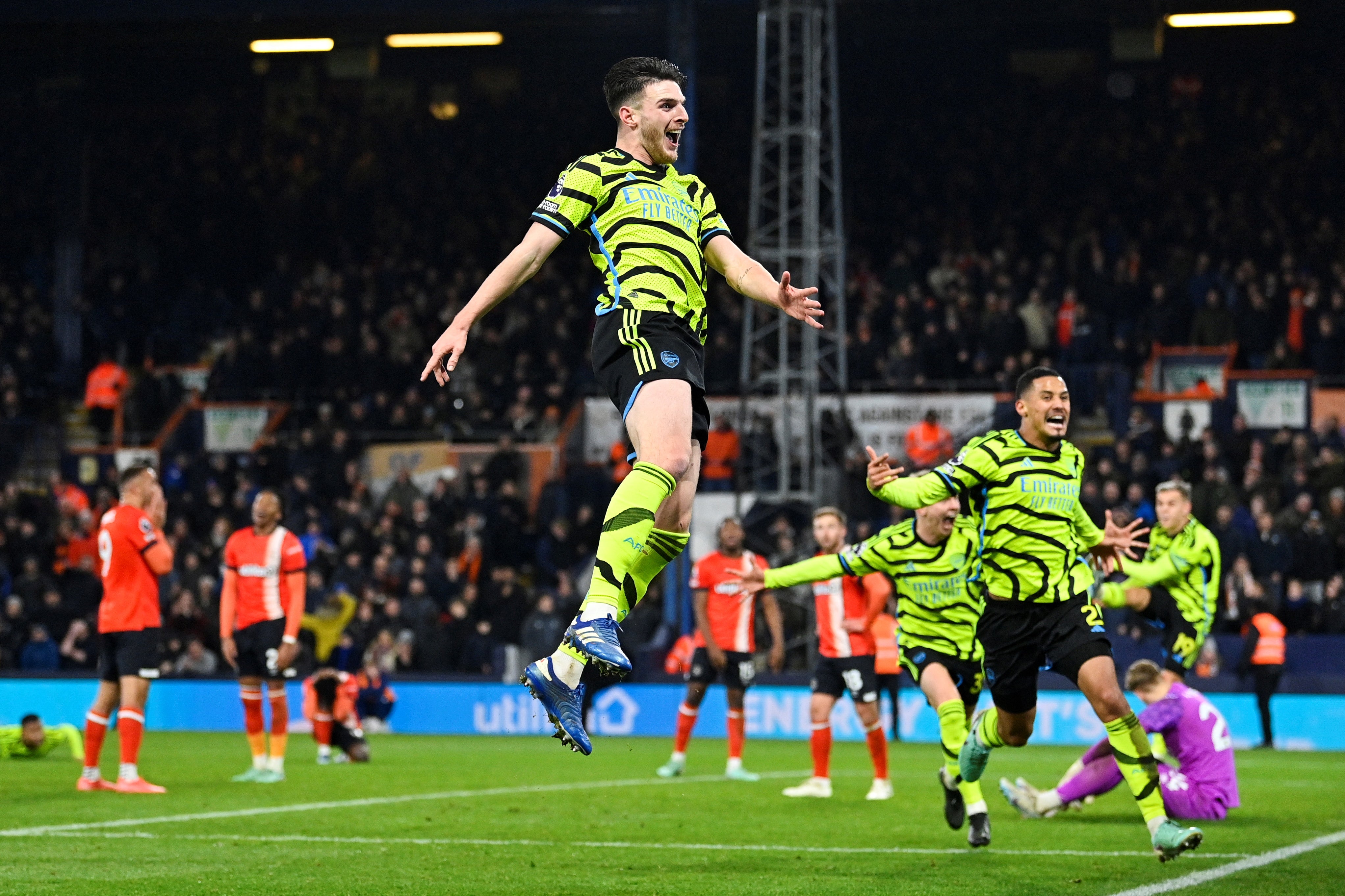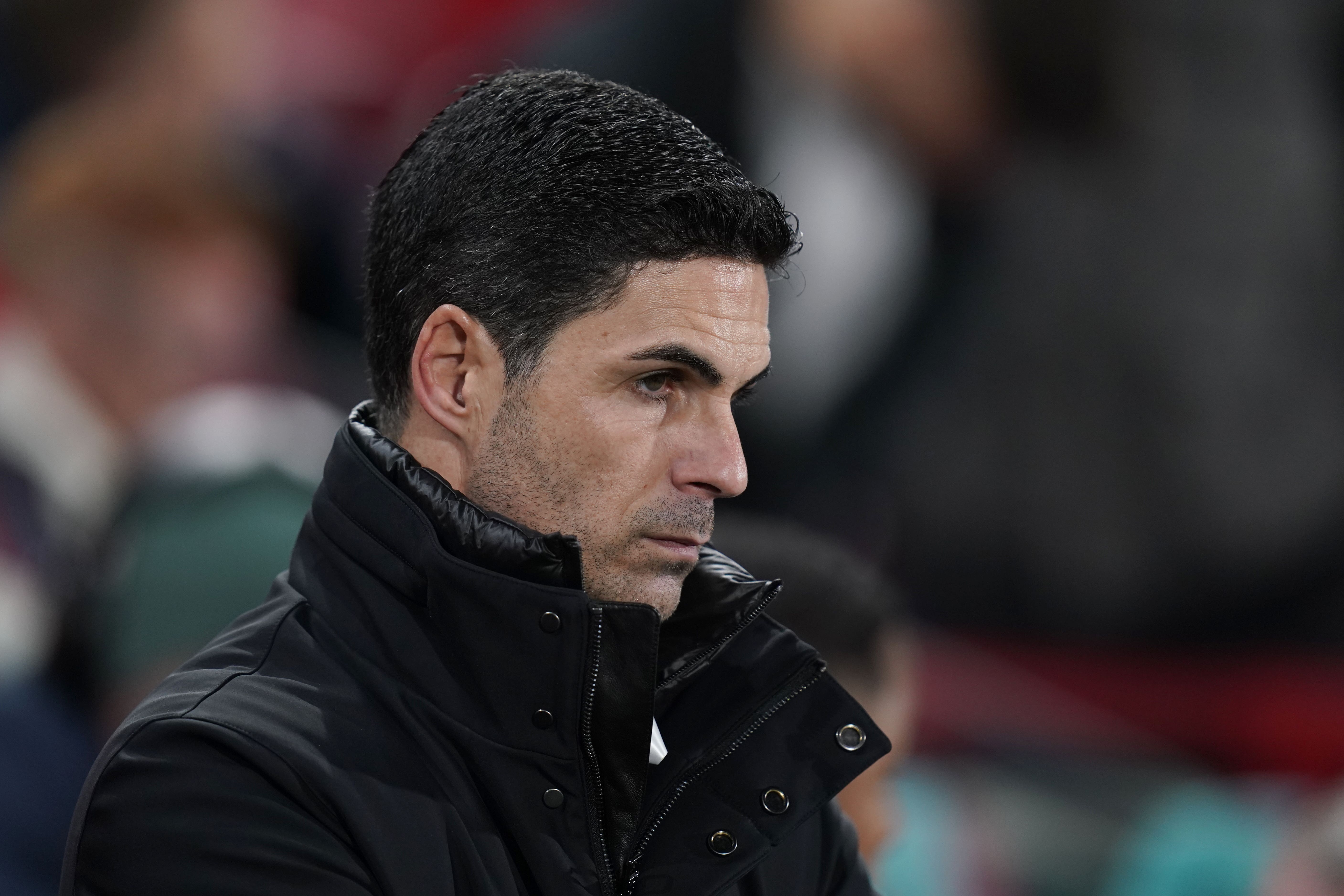Declan Rice scored a last-gasp winner for Arsenal against Luton on Tuesday
Sign up to Miguel Delaney’s Reading the Game newsletter sent straight to your inbox for free
Sign up to Miguel’s Delaney’s free weekly newsletter
Thanks for signing up to the
Football email
Despite the fury of the Kenilworth Road crowd as Arsenal celebrated, Rob Edwards was much more accepting of it all. The Luton Town manager had after all seen it coming. That wasn’t in the sense of the bigger club always getting the added time and eventually the winning goal, but more as regards trying to prepare for what Arsenal can do.
Edwards spoke to Thomas Frank in the days before this chaotic 4-3 at Luton, specifically to plan for how the league leaders beat you late on. Declan Rice’s goal was the fifth in 15 Premier League games so far this season where Arsenal scored a game-changing goal after the 84th minute. The fourth had been Kai Havertz’s 90th-minute winner at Brentford, so Frank knew well. At 3-3 going into that 96th minute, Edwards similarly knew what was coming. There’s a considerable difference between that and being able to do something about it, though.
“The cross is on the money,” Edwards said, almost appreciative of the “world-class quality” he’d just witnessed. “It’s decided by top players.”
The great question is whether that will remain “top” in just the general sense or if all of this will eventually lead to Arsenal being top of the league when it matters most. While there is nothing in football like a late winner – as the scenes at Kenilworth perfectly illustrate – such goals don’t always mean the same thing.
They can even go one of two ways.
Declan Rice celebrates after his 97th minute winner clinched the points for Arsenal
On the one hand, late strikes display the psychological resilience that divides champions from the rest. On the other, if you keep needing them, they show a weakness that will eventually cost you.
Edwards’s comments would indicate he thinks it’s the former. Arteta very much pursued that line.
“We didn’t really concede against nothing,” the Arsenal manager said, before referencing the manner of two Luton goals that might otherwise be cause for concern. “It was the two set plays and the goals that we scored. Apart from that there was nothing else. They were really efficient in the box today and that’s credit to the opponents. You have to accept that.”
Arteta might say there’s another fact for critics to accept. The games where Arsenal have claimed big late goals – 3-2 over Manchester United, 1-0 against Manchester City, 2-2 against Chelsea, 1-0 against Brentford, and now this – were all very different types of matches.
Three were conceding too much, albeit against major rivals. The other two were from markedly tight games. What felt most relevant here was the composure Arsenal showed as the game ticked towards those final few minutes. It was all the more marked given it represented such a contrast from the chaos that characterised the game up until then. Edwards’s gameplan had largely worked.
“They tried to be controlled,” he said afterwards. “We tried to make it chaotic and be aggressive and brave.” The latter were the qualities that Arsenal had to show. There was certainly no fear there. That is also why there shouldn’t be too much concern about so often leaving it late.
Arsenal boss Mikel Arteta celebrated another late winner on Tuesday night
It now just shows Arteta has a variety of ways to win games, and not just in the sense of when they come. It’s also how they come. Arsenal’s second goal of the game, a fine header from Gabriel Jesus, ensured 11 different players had scored 11 consecutive goals.
This was no mere quirk. It is a product of the manager consciously trying to add tactical variation and vitality from last season. Rice himself showed that even if goals weren’t the main reason Arteta signed the midfielder, it’s a welcome development. Rice has claimed two of those big late goals now.“ Those are the moments you look back on,” he said afterwards. “to score the winner is an honour.’
There were also further signs of Havertz finding his role. Even after the German’s crucial equalising strike to make it 3-3, there was one forceful run that pushed Arsenal much higher up the pitch and fostered further momentum. That is a real effect. It can change the tone of games.
A draw would actually have been all the more frustrating since there were frequent passages when Arsenal’s attack clicked and they put together clinical moves Luton could do nothing about. Ben White’s surge and clipped cross for Jesus was one such moment. So was the Brazilian’s divine touch for Havertz.
“They have different qualities that complement each other really well,” Arteta said afterwards. “I thought Kai again, had his best game. He’s getting better and better. That’s what we need – players getting better and raising to their best level.”
You can start to see Arteta’s ideal, where the front six combine in a flowing fashion, so there are goals coming from every angle.
This is especially important at the start of December, as club hierarchies start to talk seriously about potential January business. The discussion for a while has been over whether Arsenal might sign a finisher like Ivan Toney. Arteta’s preference, however, is for the team to not be dependent on one scorer.
The point is supposed to be you don’t know where it’s coming from. Opposition managers just know, as Edwards indicated, that it is coming.
Source: Read Full Article


